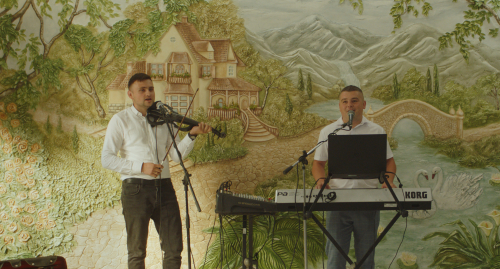
Nabis Filmgroup, Nevada Cine
MOVIE REVIEW
The Klezmer Project (2023)
What happens when a self-described “mediocre cameraman” falls in love with a klezmer clarinetist he meets at a wedding in Buenos Aires? They get funding from Austrian television to make a documentary about klezmer music in Eastern Europe, of course. This unusual Argentinian documentary melds three intertwined strands – Yiddish folk tales, the lives of and the romance between the directors and the search for Jewish music in the parts of the world where the Jews were most thoroughly exterminated – into a story of how music and language are used as the building blocks for personal identity, and what personal identity means in a globalized world. It’s not an entire success, largely for reasons which should have been obvious to codirectors Leandro Koch and Paloma Schachmann before they started, but it’s such an unusual story the weaknesses are easily forgiven.
The metafiction which shows the making of the documentary – and Mr. Koch’s and Ms. Schachmann’s relationship – alongside the road trip to Romania, Moldova and Ukraine works better than it should. The musicians, all men, aren’t interviewed about their lives, but instead about their songbooks. The interest here is in the melodies, and whether those melodies had their genesis in Yiddish styles, which were largely lost to the Holocaust. The glimpses of the musicians’ homes, which are filled with kilim rugs and electronic keyboards, are so interesting that a little more lingering wouldn’t have gone amiss. All of them are aware that they are the guardians of a dying tradition, and their knowledge goes beyond being able to fill a dance floor at milestone parties, but they seem to take this knowledge lightly – it’s just songs. The directors also spoke with some ethnomusicologists, such as the American who moved to Moldova specifically to chase down all possible remaining remnants of Yiddish music in the area. All of this is intercut with a folk tale, read by Perla Sneh in Yiddish, told from the point of view of Satan, as he entices a gravedigger’s son and a rabbi’s daughter with the possibilities knowledge can offer them outside of their little village.
And all of this further contributes to a discussion the shape of Jewish identity around the world, why the state of Israel turned its back on Yiddish to embrace Hebrew as its common language, and how that decision permanently altered worldwide Jewish culture as well. The Jews from Buenos Aires have a very different outlook on their culture than the people met on the travels, but the footage of different weddings and the ways in which people celebrate together bound to music is allowed to make its own point. The trouble is that the directors’ curiosity is not matched by expertise; and while the unusual subject matter is clearly what brought this to the Berlinale, it’s not hard to see that they had to go meta to make up for weaknesses elsewhere. Of course, if they’d done more research before they set out, they probably never would have left. Music is one of the most important ways groups of people come together, so while songs are just songs, they are also a cultural keystone as well as a core component of someone’s cultural identity. “The Klezmer Project” is not a total success, but it’s so interesting it doesn’t matter.
Comments